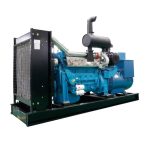Introduction
Diesel generators are essential equipment in various industries, providing reliable power supply in remote locations, during emergencies, and in areas with unreliable grid power. However, operating diesel generators at high altitudes presents unique challenges due to the decrease in air density and oxygen levels. In this article, we will explore the factors that affect the performance of diesel generators at high altitudes and discuss strategies to optimize their operation under such conditions.
Understanding High-Altitude Operation
High-altitude operation refers to the use of diesel generators in locations situated at elevations above sea level. As altitude increases, the air becomes thinner, resulting in lower air density and reduced oxygen levels. This decrease in oxygen can have a significant impact on the combustion process within the diesel engine, affecting its performance and efficiency.
Challenges of High-Altitude Operation
1. Reduced Power Output: One of the primary challenges of operating diesel generators at high altitudes is the decrease in power output. The lower air density at high altitudes leads to reduced oxygen available for combustion, resulting in incomplete fuel combustion and lower engine efficiency. This can translate to a decrease in power output, affecting the generator's ability to meet the required load demands.
2. Fuel Consumption: The decrease in air density at high altitudes can also affect fuel consumption in diesel generators. Inadequate oxygen levels can lead to incomplete combustion, resulting in unburned fuel and increased fuel consumption. This not only increases operational costs but also contributes to higher emissions and environmental impact.

3. Starting and Reliability Issues: High-altitude operation can pose challenges during the starting process of diesel generators. The reduced oxygen levels can affect the combustion process, making it harder to start the engine, especially in cold weather conditions. Moreover, the reliability of the generator can be compromised at high altitudes, leading to potential downtime and operational disruptions.
Optimizing Diesel Generators for High-Altitude Operations
To address the challenges associated with high-altitude operation, it is essential to implement strategies to optimize the performance of diesel generators in such environments. The following are some key considerations for optimizing diesel generators for high-altitude operations:
1. Engine Design and Compression Ratio: The design of the diesel engine plays a crucial role in its performance at high altitudes. Engines with higher compression ratios are better equipped to compensate for the lower air density by compressing the air-fuel mixture more effectively. Manufacturers may offer specific engine models designed for high-altitude operation, featuring optimized compression ratios and fuel delivery systems.
2. Turbocharging and Intercooling: Turbocharging is a common technique used to increase the air intake pressure in diesel engines, improving combustion efficiency at high altitudes. By compressing the intake air, turbochargers boost the engine's power output and compensate for the reduced oxygen levels. Intercooling, which involves cooling the compressed air before it enters the engine, further enhances combustion efficiency and engine performance.
3. Fuel Injection System: The fuel injection system in diesel generators plays a critical role in ensuring efficient combustion at high altitudes. Modern engines are equipped with advanced fuel injection systems that can adjust fuel delivery based on altitude and operating conditions. Electronic fuel injection systems offer precise control over fuel delivery, optimizing combustion efficiency and reducing fuel consumption.
4. https://www.lkpowerplant.com/product/open-type-high-quality-600kw-diesel-generator-set-powered-by-yuchai-brand-diesel-engine/ : The air intake system of diesel generators should be designed to maximize air flow and filtration efficiency at high altitudes. Clean and unrestricted air filters are essential to ensure sufficient oxygen supply to the engine. Additionally, the design of the air intake system should minimize pressure drops and restrictions to enhance engine performance.
5. Altitude Compensation Systems: Some diesel generators come equipped with altitude compensation systems that automatically adjust engine parameters based on the operating altitude. These systems can optimize fuel delivery, timing, and air-fuel ratio to ensure optimal performance at high altitudes. Altitude compensation systems help maintain engine efficiency and power output across varying altitudes, reducing the need for manual adjustments.
6. Regular Maintenance and Monitoring: Proper maintenance is essential to ensure the reliable operation of diesel generators at high altitudes. Regular servicing, including engine tune-ups, filter replacements, and fuel system checks, can help prevent issues related to altitude operation. Additionally, monitoring key parameters such as engine temperature, exhaust gas emissions, and fuel consumption can provide valuable insights into the generator's performance and efficiency.
7. Cold-Weather Preheating: In cold climates at high altitudes, preheating systems can be beneficial for diesel generators to facilitate easier starting and improve engine performance. Engine block heaters, coolant heaters, and battery warmers can help maintain optimal operating temperatures and ensure reliable operation in cold weather conditions. Preheating systems can reduce wear on engine components and minimize startup issues caused by low temperatures.
Conclusion
Operating diesel generators at high altitudes presents unique challenges due to the decrease in air density and oxygen levels. However, by implementing the right strategies and optimization techniques, it is possible to enhance the performance and efficiency of diesel generators in such environments. Engine design, turbocharging, fuel injection systems, air intake systems, altitude compensation, regular maintenance, and cold-weather preheating are essential considerations for optimizing diesel generators for high-altitude operations. By addressing these factors, industries and businesses can ensure reliable power supply in remote locations and challenging environments, contributing to operational efficiency and sustainability.
